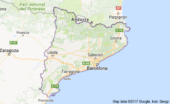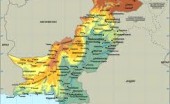Johannah Bernstein post: "eternally proud of my father’s extraordinary aeronautical engineering. legacy. here is a photo of the Canadair Water…
Wednesday Night #1619 with Karen McCrimmon
Written by Diana Thebaud Nicholson // March 13, 2013 // Wednesday Nights // Comments Off on Wednesday Night #1619 with Karen McCrimmon
Another Wednesday that proved to be anything but a slow news day — even though there are one in seven odds, we are always struck by how many major events happen on Wednesdays. Given the presence of Karen McCrimmon, the major topic for this Wednesday was Marc Garneau’s withdrawal from the Liberal leadership race; but of course the Habemus Papam announcement will have far greater impact on the world.
Thanks to Guy Stanley and a mutual friend, Karen McCrimmon (yes, she is also on Twitter: https://twitter.com/karenmccrimmon) will be joining us this Wednesday. As you should know already, Karen is a Canadian Forces Lieutenant Colonel who was the first female Navigator and the first woman to command a Canadian Forces air force squadron. Less well known is the fact that her father was a metallurgic technician employed by the A.V.Roe Company to work on the AVRO Arrow CF-105 (see Avro Arrow: postscripts to Wednesday Night #777 ) – would that fact make her a proponent, along with retired General Lewis MacKenzie, of the revival of that iconic aircraft as an alternative to the (unlamented) F-35?
Following her distinguished military career, Karen studied facilitation, negotiation and mediation at Harvard Law School and now is a consultant to private and public organizations. Judging by the antics in the House, her post-military profession would come in very handy.
Regrettably, the candidates’ debates have been largely limited in scope (though the most recent one was better), despite calls for specific policy statements from the candidates, thus we have not heard or read much of Karen’s platform beyond her emphasis on leadership – not management – and unity, and her deep commitment to veterans’ wellbeing. We look forward to hearing her explicit views on a number of issues.
Elections are a never-ending source of news, analysis and gossip for Wednesday Night. Although many of us are consumed with the races for the Quebec Liberal Leadership and the Leadership of the federal Liberals, elections beyond our borders are likely to have a far greater geopolitical impact. The outcome of the Italian elections continues to be the subject of hand-wringing analysis and finger-pointing at policies of austerity. Uhuru Kenyatta’s narrow victory in the Kenyan vote – happily a quite orderly event despite the failure of the electronic equipment – is problematic given that he is under indictment of the ICC and will in any event be challenged by his defeated opponent. And while the world’s commentators are still assessing the effects of his rule, Venezuela will hold an election on April 14 to replace Hugo Chavez; the results appear to be a foregone conclusion, though we should never underestimate the volatility of the situation. Among numerous others scheduled, Egypt’s plethora of parliamentary elections (April to June) and the Iranian presidential election in June will likely be the most significant for events in the Arab world and Middle East.
One of the more gruesome headlines we have seen: “Saudi Arabia is considering firing squads rather than public beheadings for executions “because of the scarcity of swordsmen and their unavailability in a number of regions.”
Meantime, we will of course be keeping an eye on the Conclave which starts voting on Tuesday for the election of the successor to Pope Benedict XVI.
As we mark the second anniversary of Japan’s Fukushima disaster, the BBC reports that there is a long road to nuclear clean-up which will fuel (sorry!) the continuing opposition to nuclear power at the same time that alarms bells are going off about North Korea’s belligerent nuclear capability and endless wrangling over Iran’s intentions. In the latter case, at least there is a small sign of possible progress from Foreign Minister Ali Akbar Salehi, but for whose consumption were those comments designed?
Canada, Quebec and Montreal are always on our agenda. Last week’s jobs numbers are encouraging. But before everyone gets too excited about our economic prospects, Carleton’s Professor Roy Culpepper and John Jacobs have issued a gloomy forecast regarding the effects of the Canada-Europe Trade Agreement (CETA) on jobs.
Quebec’s Language debate … We would note with glee that the finest gift we received for International Women’s Day was the news that Louise Marchand had resigned as the head of the OQLF. Meanwhile, the campaign against Bill 14 has gained huge momentum, but nastiness and stupidity are far from dead.
Leaving aside the Charbonneau commission, the major Montreal news is that Concordia’s professors have voted for a strike mandate. One comment on the Gazette story about sums it up: Students want free tuition, professors want raises, Quebec wants to separate. Poor taxpayers have to pay for it all. There is no free in freedom.


